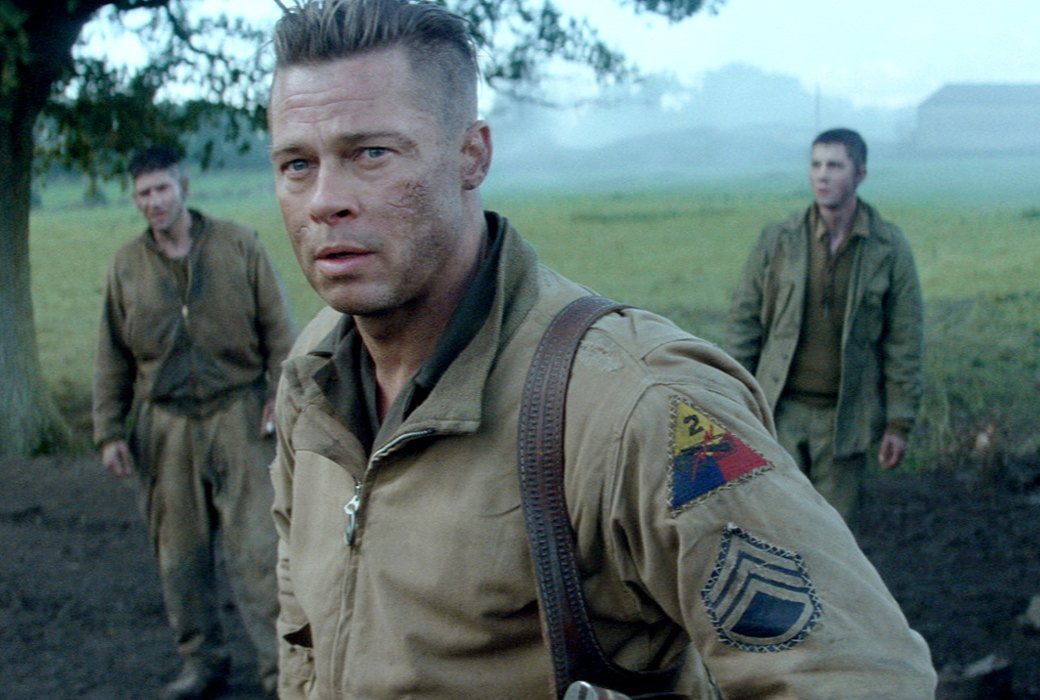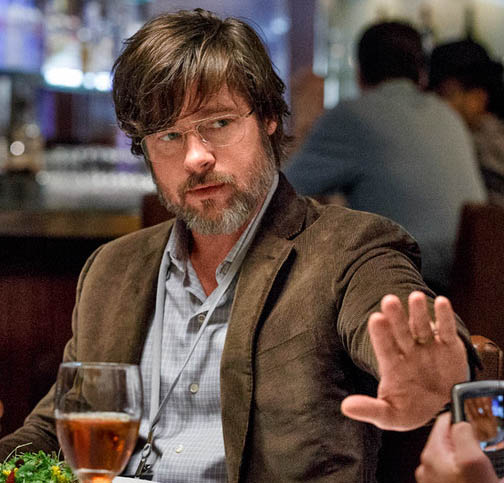As the bald title suggests, Fury is a work of righteous, focussed rage. It's a combat film which swaps preaching and profundity for pure anger at the brutalising, destructive war machine, and still manages to be illuminating. For, even at its most thrillingly Hollywood, Fury retains a keen sense of the waste of life. Director David Ayer's fifth film features explicit, immersive and impactful violence and works best when it's pummelling the audience and Nazis alike, with deafening, meticulously executed action that threatens to punch a hole through both the screen and your ear-drum.
Set in April 1945 in the dying days of World War II, Fury finds the American forces exhausted, diminished, bested by superior weaponry and deep in the heart of enemy territory. With Hitler having declared "total war" and the Germans defending their own soil, the fight is at its most terrifying, desperate and bitter. Brad Pitt (pictured below right) plays Don "Wardaddy" Collier, a tough, seemingly invulnerable tank commander who's made acting sergeant as the Allied numbers dwindle. His devoted, dishevelled team consist of Boyd "Bible" Swan (Shia LaBeouf), Grady "Coon-Ass" Travis (Jon Bernthal) and Trini "Gordo" Garcia (Michael Peña).
 Don's replacement for his fifth man, decapitated by enemy fire, is the baby-faced Norman Ellison (Logan Lerman), who can type 60 words a minute - not terribly useful given the context - and no-one disguises their disappointment at the new addition to the crew. Told not to get too close to anyone, Norman's ominous and unbelievably disgusting first assignment is to clean his predecessor's blood and bodily fragments from inside the armoured vehicle. Fury is set significantly in the Sherman tank these men call home; snapshots and girly pictures are displayed alongside the Nazi trophies they've ripped from corpses.
Don's replacement for his fifth man, decapitated by enemy fire, is the baby-faced Norman Ellison (Logan Lerman), who can type 60 words a minute - not terribly useful given the context - and no-one disguises their disappointment at the new addition to the crew. Told not to get too close to anyone, Norman's ominous and unbelievably disgusting first assignment is to clean his predecessor's blood and bodily fragments from inside the armoured vehicle. Fury is set significantly in the Sherman tank these men call home; snapshots and girly pictures are displayed alongside the Nazi trophies they've ripped from corpses.
With its macho camaraderie and sense that the men are hopelessly and relentlessly outnumbered and outgunned Fury resembles nothing more than a western (The Wild Bunch springs most to mind). It occasionally threatens to tip over into "The Little Tank That Could" territory, and is saved from doing so by its strong handle on not just the colossal, continuous loss of life (with blood and bodies everywhere and danger around each corner), but what is lost in these men, perhaps forever. The animalistic Grady (excellent work from Bernthal) is the prime example of what war does to a man, but even the more sympathetic Don is frequently forced to hide his humanity, adopting a savagely-cruel-to-be-kind approach in order to save them all.
It's much more powerful during scenes of combat
Tight-jawed and thick-skinned with his baby blues twinkling from a battle-scorched face, Pitt is a picture of holding-it-together heroism. The heavy losses see him continuously promoted and there's the slightly hyperbolic sense that the burden of the Allies' success lies solely on his shoulders - but that's perhaps how many in his situation felt. It's a committed and restrained performance, which may even bag him his fourth Oscar nomination. And it's rather a case of Pitt the older and younger here with the similar-looking Lerman establishing his acting chops, and showing a firm grasp of a tough character arc.
Fury is far from perfect - the grim predicament of German women is squeamishly skirted around despite an awkward attempt to address this, and it's much more powerful during scenes of combat than during scenes of (relative) quiet. Filmed in 2012, Ayer's last film Sabotage was released earlier this year and in its wasted cast and messy execution it had all the hallmarks of a film that had been slung together. With the release of the considerably more polished Fury so hot on its heels, we can now see where Ayer's heart was.
BRAD PITT’S BIG MOMENTS
 Allied. Doomed but entertaining attempt to revive 1940s Hollywood
Allied. Doomed but entertaining attempt to revive 1940s Hollywood
Inglorious Basterds. Pitt is gloriously absurd in Tarantino WW2 alternative history
Killing Them Softly. Brad Pitt cleans up an almighty mess in Andrew Dominik’s high-calibre crime ensemble
Moneyball. How Billy Beane created a revolution in Major League baseball
The Big Short. Pitt’s on the money as director Adam McKay successfully makes a drama out of a crisis
The Counsellor. Ridley Scott ensemble thriller is nasty, brutish and short or mysterious, upsetting and alluring
The Tree of Life. Terrence Malick’s elliptical epic leads us through time, space and one family’s story
PLUS ONE TURKEY
World War Z. It's World War with a Zee as Brad Pitt battles the undead and a zombie script
Overleaf: watch the trailer for Fury

 Don's replacement for his fifth man, decapitated by enemy fire, is the baby-faced Norman Ellison (Logan Lerman), who can type 60 words a minute - not terribly useful given the context - and no-one disguises their disappointment at the new addition to the crew. Told not to get too close to anyone, Norman's ominous and unbelievably disgusting first assignment is to clean his predecessor's blood and bodily fragments from inside the armoured vehicle. Fury is set significantly in the Sherman tank these men call home; snapshots and girly pictures are displayed alongside the Nazi trophies they've ripped from corpses.
Don's replacement for his fifth man, decapitated by enemy fire, is the baby-faced Norman Ellison (Logan Lerman), who can type 60 words a minute - not terribly useful given the context - and no-one disguises their disappointment at the new addition to the crew. Told not to get too close to anyone, Norman's ominous and unbelievably disgusting first assignment is to clean his predecessor's blood and bodily fragments from inside the armoured vehicle. Fury is set significantly in the Sherman tank these men call home; snapshots and girly pictures are displayed alongside the Nazi trophies they've ripped from corpses. Allied
Allied